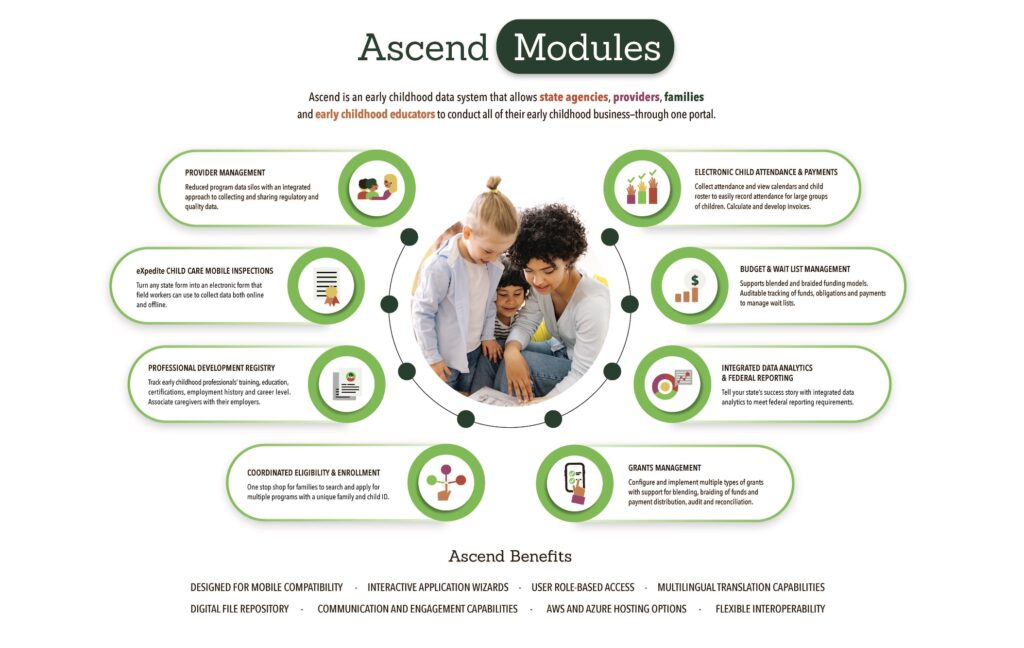The Challenge
State licensing regulations require that early childhood education and care (ECEC) providers employ teachers and caregivers who meet certain education, training and professional development qualifications. Therefore, licensing regulations and teacher/caregiver qualifications are inextricably linked.
Without tight integration of licensing and a professional registry systems and business processes, the State will experience significant barriers to managing and accurately reporting on the child care landscape. Additionally, providers and the workforce bear an undue administrative burden, often having the share the same information more than once.
Risks and inefficiencies:
- Employment history is not verified by the provider.
- Registry profiles may not match educator records in licensing system.
- Providers have no centralized place to manage their licensing and personnel information.
- State inspection process to review staff qualifications and training history is labor intensive.
- Cumbersome and inaccurate federal and state reporting.
- Ineffective state policy and investment decisions.
Example Scenario

Charise: The Provider
Charise was granted a child care center license by the state. Charise has 4 classrooms and 20 staff. She spends 80 hours/year tracking her staff training and professional development. She maintains hard copy staff files and an excel tracking sheet. She spends another 80 hours/year submitting other state required documentation to maintain her license.
Charise wishes she had one place to submit and store documentation that demonstrates compliance with all licensing requirements, including staff qualifications.

Kate: The Educator Staff
Kate completed her CDA in 2020 and is currently employed as a Lead Teacher in the Toddler Room at Charise Little’s licensed center. Charise maintains Kate’s CDA certificate and training certificates in a hard copy staff file.
Before going to work for Charise, Kate worked as an Assistant Teacher for Little Lambs licensed child care home from 2018-2019. During that time, she created a profile in the state registry. She listed Little Lambs as her employer. She also entered her high school diploma, hourly salary, current job title and 20 hours of training certificates for 2018 and 2019.
Kate has not updated her registry profile since 2019, so her CDA is not counted in state reporting.
Kate wishes that every time she completes a required training, the certificates could be stored and viewed in one place by Charise.

Bob: The State Inspection Staff
Bob is conducting an onsite licensing inspection of Charise’s licensed center. After spending 2 hours reviewing 20 hard copies of staff files, Bob determined that 2 staff are missing annual training hours, and 1 staff is missing a CDA certificate. Charise is sure that her staff meet the requirements, but she needs to take time to collect the missing documentation. Bob issues related citations that will be posted on the consumer education website. He gives Charise 10 days to mail documentation to correct these insufficiencies.
Bob wishes he had a centralized place to view staff records prior to his onsite licensing visit and an alert mechanism to give Charise time to correct staff documentation insufficiencies before he arrives and must issue a citation.

Camilla: The Trainer
Camilla works for Early Childhood Training, Inc. The state funds this organization to provide free training to early childhood educators. Educators can search and register for free training on the state early childhood training website.
Charise registered and attended 5 hours of Camilla’s online training. Camilla emailed the training certificates to Charise, but she had the wrong email address, so Charise never received the certificates. Charise had to call Early Childhood Training, Inc. to request a copy of her certificates so that her provider will not be cited for staff training insufficiencies.
Camilla wishes that there was an automated way to email an electronic record of training completion and as well as to insert it into the educator profile.

Kamal: The Data Analyst
Kamal is working on gathering data required for the Federal QPR report. The report requires states to share information about the qualifications of staff who work in licensed child care centers and homes.
Kamal wishes that the registry and licensing systems were integrated so providers could verify educator employment and qualifications in each provider facility and the federal report would be accurate.
The Solution
TCC’s Early Childhood Data Solution, Ascend, is comprised of modules that tightly integrate early childhood providers, workforce and family/child data, and business processes to give states access to all the information they need to make informed policy, management, and investment decisions in one secure solution.
